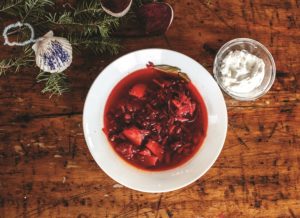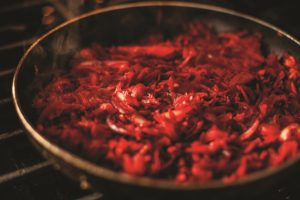Yuliia Svieshnikova has always prepared borscht, one of the 12 traditional Christmas dishes of her native Ukraine, on Jan. 6. That is Christmas Eve on the Julian calendar, which Ukrainians continued to follow when much of Europe adopted the Gregorian calendar in the 16th century.
The Orthodox Church of Ukraine decided this October to allow congregations to celebrate Christmas on Dec. 25. The change is part of the church’s effort to distance itself from the Russian Orthodox Church, whose leaders have grown increasingly cozy with Vladimir Putin.
Now, Svieshnikova, who lives in Dennis and recently started a Montessori school in Marstons Mills with her husband, Mykhaylo Bokhenok, faces a bit of a conundrum. She and her family have plans to be away on Dec. 24. “Now I’m wondering where I’m going to cook those 12 dishes,” she says.

Wherever she happens to be on Christmas Eve, Svieshnikova is game to pass along the recipe for one of the dishes she’ll make that day — her borscht. When she, Bokhenok, and their three-year-old daughter, Kvitka, came to our place in Wellfleet, it was a Slavic culinary exchange. My wife, Agata, who is from Poland, made pierogi, and Svieshnikova brought along everything we’d need to make borscht.
“For every family you visit in Ukraine, you will taste a different kind of borscht,” says Svieshnikova. Her mother’s husband prepared a version that was heavy on tomatoes, but she always found it too tart. The borscht she makes now incorporates a lot of vegetables and has beans rather than the beef or pork versions some Americans know.
Typically, Ukrainians don’t eat meat on Christmas Eve except the meat broths that are used for the borscht. Bokhenok said his family makes theirs with a beef broth. Svieshnikova uses chicken bouillon for hers, which makes the preparation a lot faster.
This is similar to the Polish tradition, Agata says, which is to serve a “clean borscht” at Christmas — “just for drinking or eating with small dumplings we call ‘ears,’ ” she says. The chunkier version that Svieshnikova makes is referred to as Ukrainian borscht in Poland. In Ukraine it’s just called borscht — and it’s never referred to as “soup.”
“People get offended if somebody calls borscht ‘soup,’ ” says Svieshnikova. “There is soup and there is borscht.”
Ukrainians might make borscht in every season but always at Christmas, says Svieshnikova. “We are trying to teach our daughter that she’s Ukrainian so she knows her culture and can be proud of it,” she says.
The traditions that Svieshnikova hopes to pass on to her daughter are not necessarily the ones she grew up with in Dnipro.
When she was young, Ukraine was still part of the U.S.S.R. Her country declared independence when the Soviet Union began to break apart in 1991 and has since been regaining its own national identity. Svieshnikova grew up with her grandparents, who were from Russia, though her grandmother is Ukrainian, she said.
Under Soviet rule, she says, “There was no religion. The party was the religion. We didn’t have many traditions, because there was no Christmas during U.S.S.R. times.” Svieshnikova says she is still learning about the ways people celebrated Christmas before the Soviets came to power, “reading why we have those traditions, how we develop them.”
In Ukraine, Orthodox Christmas is a religious holiday. But the day children look forward to is St. Nicholas Day — Dec. 19 on the Julian calendar, though with this year’s shift it was Dec. 6. On that day, children receive candy, says Svieshnikova, not from Santa Claus but from Ded Moroz, “Grandfather Frost,” a figure with roots in pre-Christian Slavic mythology. Early in the Soviet era, authorities tried to ban Ded Moroz, but his staying power outlasted that push.
Svieshnikova’s grandmother will be in Dnipro at Christmas time. She doesn’t want to move, says Svieshnikova, in spite of the constant attacks. “They bombed the market where I used to go as a child,” she says. “They destroyed a bus station; they’ve bombed the power station a couple of times. In Ukraine right now people live in a world of sirens.”
During this time of war, Svieshnikova says experiencing her Ukrainian identity has taken on heightened significance. Until she met Bokhenok, she says, she spoke Russian rather than Ukrainian. That’s because when she was growing up, people who spoke Ukrainian were considered unsophisticated: “If you were speaking Ukrainian, someone would ask, ‘What language are you speaking? Are you coming from the village?’ ”
Things have changed. “This war is the beginning of a new life for Ukrainians,” says Svieshnikova. “We were taught that the Russians and U.S.S.R. were great and powerful. Now, you feel like people were lying to you your whole life.
“We’re going to rewrite history,” Svieshnikova adds. “I’m very proud of these changes, but the price that we have to pay for this is just too high.”

Although Svieshnikova still isn’t sure where she’ll prepare her 12 dishes — or on what day — when she does, it will be an intentional cultural act.
Despite the war, there will be borscht at Christmas. Svieshnikova’s grandmother will make her traditional recipe with no beef. Surprisingly, it has no beets, either. Beets or no beets, it is a central part of Ukrainian identity.
Svieshnikova’s will be full of vegetables, and because hers does include beets, it will be a deep purple-red. It will also be hot. “When I serve food,” she says, “I like to see steam coming out of it.”
Ukrainian Beet, Potato, and Bean Borscht
Served with pampushky — a garlic bun — and sour cream.
10 cups water
2 Tbsp. chicken bouillon paste
3 or 4 medium potatoes, cut into small cubes
2 tomatoes
2 carrots, grated
3 beets, grated
½ large onion, sliced thin
Vegetable oil
1 can kidney beans
Fresh lemon juice
2 bay leaves
- Boil the water and add the bouillon paste to make a broth. Add potatoes to the broth, and while they simmer, place tomatoes in a deep bowl and cover with boiling water.
- While the potatoes are simmering and the tomatoes are sitting, grate the vegetables. Fry onion in vegetable oil until translucent. Add the carrots and then beets to the onion, frying for a few minutes but without letting them caramelize.
- After about 10 minutes, the tomatoes should be soft enough to peel easily. Skin the tomatoes, dice them, and add them to the frying pan. Cook the vegetables for another 15 minutes on medium-low heat.
- Squeeze the juice from a quarter of a lemon into the vegetables and add them to the pot with the potatoes. Cook for 5 minutes on medium heat. Turn off the heat and check, adjust for salt and pepper, and add the bay leaves and the kidney beans, rinsed and drained. Let sit for an hour for flavors to meld.
- At serving time, heat the borscht again so it is nice and hot.



